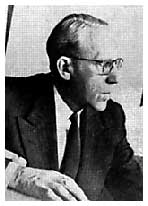Hello Dr. Wertham, thank you for having me.
(cough)
"INSTITUTIONALIZED LYNCH"
quote:
Art fell on its knees. Pressure was put on the publishers . . . English fiction became pure . . . But at this point human nature intervened; poor human nature! when you pinch it in one place it bulges out in another, after the fashion of a lady's figure.
— George Moore
Confessions of a Young Man (1886)
THE CENSOR'S unequivocal 'You must not!' is seldom answered with an equally uncompromising 'I will!' Ashamed to oppose the censor's morality, and afraid to contravene his authority, the writer's first reaction is to evade the censorship, to see what can be sneaked through, what can be gotten away with, what can be disguised just enough to pass the censor but not so much as to escape the audience.
Hypocrisy, equivoque, misdirection: these are the subterfuges to which censors are blind, upon which audiences smile. The bawdy word, the rebel thought, the concept still taboo: these the author backs in upon the stage, masked and muffled, with arrows tangled in their hair pointing all in fraudulent directions. Words, thoughts, ideas — all are punned upon, hinted at, symbolized, turned upside-down,and acrosticked, acted out in idiotic mummery, and finally, for the benefit of the dullest, are lettered out in kindergarten style. Thus Shakespeare's 'Her very C's, her U's, 'n' her T's' (Twelfth Night, II.v.88), the meaning of which puzzles professors so much, audiences so little. When genius must stoop to the nursery subterfuge of spelling its tabooed word out, nothing is to be expected of lesser craftsmen in resisting the censorship of sex.
The author pauses before truth, one eye furtively upon the censor, the other leering at his audience. He gibbers, he capers, he thumbs his nose and fires off popguns, but the truth is not in him. Now, as in Isaiah's time, truth is fallen in the street, dragged back & forth in mud lest the censor see it. His integrity forfeit — pawned, gone ———— forgotten — the author juggles nonsense before the censor's face, the sense of nonsense behind his back. He tips his audience the broad wink of the elliptical dash —— batters them clownishly on the head with a bladderful of asterix, pokes them in the ribs with a knowing blank to represent coitus inconsummatus; takes up his castrated tale again with 'Later . . . .'
He is a writer. He is Prometheus. His is the guardianship of light. But fear infects him. And from leader — light bearer — he has fallen away to jester and dishonorable jape. Truth is falsified, falseness made more false, darkness dissipated not at all by his flameless fire.
What can be said for men of letters whose vindication of the basic human right to freedom of speech can rise no higher than piddling and surreptitious naughtiness, cocked snooks when the censor's back is turned? Only that this sort of humor is not undertaken by grown men strictly as humor, but rather as their resistance to an oppressive censorship, for the sheer éclat of twitting and out-witting it. That, as resistance, it is ineffective, is due primarily to its being scaled so very small. For pranks and paraphrase and token resistance have their limits, and these are quickly reached. Having buffooned it to the end of the censorship tether—and it is short—the only recourse for both artist and audience in transvaluation, displacement, the siphoning off of the suppressible urge for expression elsewhere.


<< Home